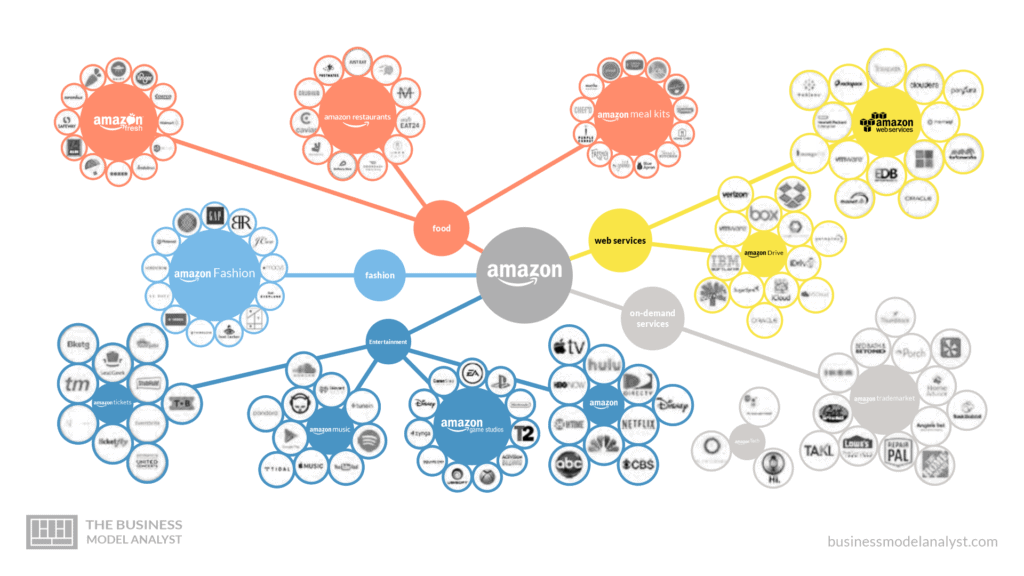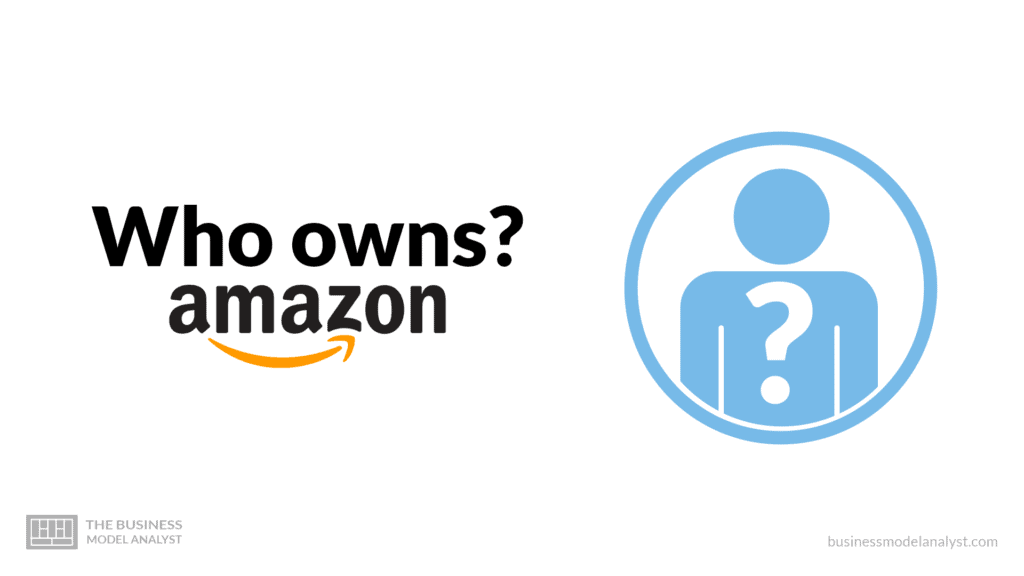Who owns Amazon? Amazon is owned by a series of entities, with the most influential being its executive chairman, Jeff Bezos. Bezos is the company’s largest shareholder, owning about 10% of its stock.
Along with Bezos, the remaining shares of Amazon are held by a variety of stakeholders, including institutional and mutual fund investors, individual investors, and other corporate entities. Amazon has also received investments from several venture capital firms and private equity firms.
Additionally, Amazon’s employees own a small portion of the company’s stock through its employee stock ownership plan. So, while Jeff Bezos is the most influential shareholder of Amazon, it’s important to remember that ownership of the company is quite diversified. Whether we’re talking about individual investors, institutional investors, or the company’s employees, the ownership of Amazon is shared among many people and entities.
Contents
Owners of Amazon
Jeff Bezos
Jeff Bezos is the founder and current executive chairman of Amazon, the world’s largest online retailer. Bezos has been involved with Amazon since its inception in 1994 and currently owns a 10% stake in the company. His stake is worth approximately $90 billion, making him one of the world’s wealthiest people. Bezos is also the founder and controlling shareholder of The Washington Post and Blue Origin, a space exploration company.
Other Shareholders
In addition to Bezos, several other stakeholders own Amazon. Vanguard Group is the largest shareholder in the company, owning 6.5% (664,770,900 equities) of Amazon’s shares. BlackRock is the second-largest shareholder, owning 3.6%. SSgA Funds Management, Inc. comes in third with 3.23% of Amazon shares as of January 2, 2023. Other shareholders include Fidelity Investments, T. Rowe Price, Geode Capital Management LLC, and Capital Research Global Investors.
In total, more than 1 million other individuals and institutions own shares of Amazon. Together, they own more than 50% of the company.
Over the past several years, Amazon’s share price has risen significantly, making it one of the most valuable public companies in the world. As a result, the majority of Amazon’s shareholders have seen their investments grow significantly in value.
How Jeff Bezos Became the Owner of Amazon
Early Life and Education
Jeff Bezos was born in New Mexico in 1964 and grew up in Houston, Texas. He showed an early interest in science and computers and even took a summer job at McDonald’s, where he spent the summer studying their automation improvements. He attended Princeton University, where he studied computer science and electrical engineering, and graduated summa cum laude in 1986. Throughout his academic years, Bezos was an outstanding student and began to develop an interest in business and technology. He was also known for his ability to think outside the box and look for creative solutions to problems. After graduating from Princeton, Bezos worked for a variety of tech companies in the US and abroad.
Career Path
Jeff Bezos subsequently worked for several tech firms in New York, including Fitel, Bankers Trust, and D.E. Shaw & Co. He left D.E. Shaw & Co. in 1994 to start his own business. Bezos founded Amazon.com in 1994, an online bookseller that eventually became the largest e-commerce website in the world. Bezos had a vision for Amazon and quickly expanded the company’s offerings to include a variety of products, ranging from electronics and media to clothing, toys, and groceries. Bezos also spearheaded Amazon’s move into the world of cloud computing, developing Amazon Web Services in 2002.
Founding of Amazon
Bezos founded Amazon in 1994 with the goal of creating an online marketplace where people could buy and sell goods. Amazon began as an online bookstore, but quickly grew to include many other products. Bezos took a bold approach to running Amazon, taking risks with innovative strategies and expanding the company quickly.
Bezos’s leadership skills and out-of-the-box thinking helped Amazon become one of the most successful companies in the world. Amazon has also revolutionized the way people shop, with products being shipped to customers worldwide and an innovative approach to customer service. Bezos is now one of the wealthiest individuals in the world, and Amazon is one of the most valuable companies on the planet.
History of Ownership
Amazon’s IPO
Amazon’s IPO (initial public offering) was one of the most successful IPOs in history. On May 15, 1997, Amazon went public on the NASDAQ with an initial offering price of $18 per share, raising $54 million. It was a risky move for Amazon, as the company had yet to turn a profit and had only been operating for three years.
Investors were initially wary of Amazon’s IPO, as the company had yet to turn a profit and the online retail industry was still relatively new. However, the market responded positively, and the stock closed at $23 per share on the day of the IPO, giving the company a valuation of $560 million.
In the years since its IPO, Amazon has become one of the most successful companies in the world. The company has made several acquisitions, expanded into new markets, and revolutionized the way people shop. In 2018, Amazon achieved a market capitalization of over $1 trillion, making it the second company (after Apple) to reach that milestone.
The success of Amazon’s IPO has been credited to its innovative approach to customer service, its ability to quickly adapt to changing markets, and its relentless focus on customer satisfaction. Amazon’s IPO marked the beginning of a new era of digital commerce, and it is a case study of how to execute a successful IPO.
How Jeff Bezos Controls Amazon
After initially focusing on books, Amazon quickly expanded its product offerings to include electronics, apparel, home goods, and more, becoming one of the largest online retailers in the world. Today, Bezos still serves as Amazon’s executive chairman after stepping down as CEO in 2021 and is the majority owner of the company.
According to Marketscreener, Bezos owns about 992,633,688 shares/equities of Amazon’s stock, which accounts for about 10% of the company’s outstanding shares. This translates to a stake of roughly 10% of Amazon’s total voting stock.
Bezos’ control over Amazon has been a source of both admiration and criticism. On the one hand, his leadership has been responsible for the company’s immense growth and success. On the other hand, some have criticized him for his tight grip over the company’s operations. His control has also been the subject of several antitrust investigations, as some have argued that Amazon’s immense power in the e-commerce industry has stifled competition and limited consumer choice.
Regardless of the criticism, it is clear that Bezos’ control over Amazon has been a major factor in the company’s growth. His leadership has allowed Amazon to take risks and explore new opportunities, leading to the company’s current position as one of the largest and most influential companies in the world.
Amazon Business Milestones
Amazon has achieved a variety of business milestones over the years, ranging from the launch of its signature retail services to the development of new technologies. Here is a closer look at some of the most important milestones in the history of Amazon.

Prime
Amazon Prime was launched in 2005 as a subscription service that provides customers with free two-day shipping, access to streaming video and music services, and other exclusive benefits. As of 2022, there were over 200 million Amazon Prime subscribers worldwide. Additionally, Prime members spend an average of $1,400 each year on the platform, making up a significant portion of the company’s revenue.
AWS
Amazon Web Services (AWS) is Amazon’s cloud computing platform, which was launched in 2006. As of 2022, AWS was responsible for around 16% of Amazon’s total revenue, generating over $62 billion in revenue in 2021. AWS is now used by millions of customers across 41 countries, making it one of the most popular cloud computing platforms in the world.
Marketplace
Amazon Marketplace was launched in 2002 as a platform for third-party sellers to list items for sale on the Amazon website. Today, third-party sellers account for over 65% of physical gross merchandise sales on Amazon, with gross merchandise sales totaling over $610 billion in 2021.
Alexa
Amazon’s virtual assistant, Alexa, was launched in 2014 and has since become one of the most popular virtual assistants in the world. As of 2020, there were over 100,000 Alexa-compatible devices worldwide. Alexa is now available in more than 40 countries.
Amazon devices
Amazon has released a wide range of devices over the years, ranging from the Kindle e-reader to the Echo smart speaker. By 2018, Amazon had sold over 90 million Kindle devices and over 32 million Echo devices.
Prime Video
Amazon Prime Video was launched in 2006, offering customers access to a wide range of movies, television shows, and original content. As of 2021, Prime Video was available in more than 200 countries, with over 151.9 million subscribers worldwide. Prime Video is estimated to have generated over $4.63 billion in revenue in 2021.
Amazon Music
Amazon Music was launched in 2007, offering customers access to a large library of streaming music. As of 2021, Amazon Music had over 68 million subscribers worldwide, making it the second most popular music streaming service in the world. The Amazon Music app for iPhones is estimated to have generated over $7.3 million in revenue in 2022.
Fashion
Amazon launched its fashion section in 2002, allowing customers to shop for clothing and accessories from both Amazon and third-party sellers. Amazon’s fashion section is one of the largest in the world, with over 2,782 featured brands and $7.3 billion in total sales in 2019.
Whole Foods
Amazon acquired Whole Foods in 2017 for $13.7 billion, making it one of the largest acquisitions in the company’s history. Whole Foods has over 500 stores in the US and UK, with over $16 billion in annual sales. Amazon Prime members now receive exclusive discounts when shopping at Whole Foods stores.
Amazon Go
Amazon Go is Amazon’s cashier-less grocery store, which was launched in 2016. In November 2022, there were about 29 Amazon Go stores in the US. In 2019, Amazon’s cashier-less technology was predicted to generate about $4 billion in 2021
Impact of Bezos’ Ownership on Amazon’s Success
The impact of Jeff Bezos’ ownership of Amazon has been profound. Under his guidance, Amazon has grown to become one of the largest companies in the world. Amazon’s success can be directly attributed to Bezos’ leadership, creativity, and vision, which have helped the company become an e-commerce juggernaut and a leader in the technology industry. Bezos has embraced the concept of customer-centricity, which has become an integral part of Amazon’s culture.
By focusing on customer satisfaction, Amazon has been able to build a vast and loyal customer base, which has resulted in immense growth. Bezos has also implemented innovative strategies such as Amazon Prime, which has resulted in even more customer loyalty. Bezos’ long-term vision has been to expand Amazon’s presence globally and make a positive impact on the world. This vision has resulted in Amazon’s expansion into the worlds of cloud computing, artificial intelligence, and web services.
As Amazon continues to innovate and expand its presence in the tech industry, Bezos’ ownership has been essential in leading the company to success.
Conclusion
Amazon is a global leader in e-commerce, cloud computing, digital streaming, and artificial intelligence. Founded by Jeff Bezos in 1994, it has since become one of the world’s most successful companies, with an estimated market cap of $856 billion as of January 2023. Although Bezos has stepped down as CEO of Amazon, he remains an integral part of the company’s mission, leading the company’s board of directors and providing overall guidance and direction. Amazon’s impressive growth over the last two decades is a testament to the vision and leadership of Jeff Bezos and his team, and the company is sure to continue to thrive and innovate in the years to come.


